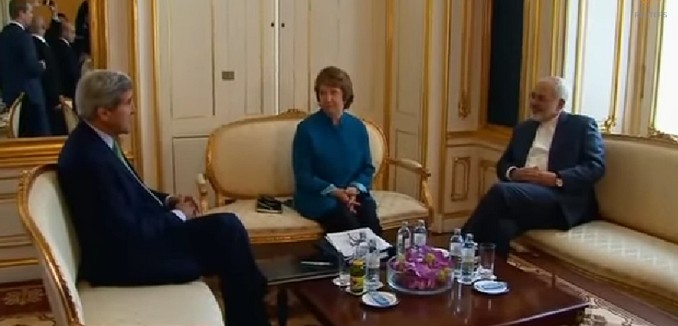In the lead article of the January 2015 issue of Commentary, Omri Ceren writes that despite assurances from the Obama administration that the nuclear negotiations with Iran would halt Iran’s progress towards a nuclear bomb, the Iranians have instead been “protected from new pressure and allowed to pursue their work toward obtaining a nuclear bomb unrestricted.” Ceren is the managing director for press and strategy at The Israel Project, publisher of The Tower.
Ceren analyzes several aspects of Iran’s nuclear program, including enrichment, plutonium work, ballistic missiles work, sanctions and verification, and in each instance finds that the administration’s boasts of success in halting Iran are empty. In fact, Ceren argues that disagreements were often “overcome by the West’s simply caving.”
In a brief review of Iran’s ballistic missile program, Ceren observes:
The administration’s reversal regarding ballistic-missile restrictions was starker still. Senator Mark Kirk had put out a graphic blasting the interim agreement for staying silent on Iran’s proliferation-sensitive missile activity, the third core weaponization issue and an area where Iran is obligated by United Nations Security Council resolutions to suspend work. An NSC official let it be known that an Iranian ballistic-missile test would “be in violation of the agreement” and cause the deal to “cease to exist.”
As if on cue, Mehdi Farahi, Iran’s deputy defense minister and the head of Iran’s Aerospace Organization General, announced that the Iranians would soon conduct exactly such a test. Obama officials quickly moved to clarify their stance. Instead of the JPOA imposing absolute restrictions on ballistic-missile tests, the JPOA apparently imposed no restrictions on ballistic-missile tests.
This failure led Ceren to conclude:
There was seemingly no detail that the administration hadn’t exaggerated in some way. Even bluster about inspections—“unprecedented transparency and intrusive monitoring of Iran’s nuclear program”—devolved in some cases into gaining some access to camera footage.
The essay ends on a sobering note, with Ceren stating:
In six months’ time, the West will be in a worse position to extract concessions from Iran. The Iranians will be in a better position to walk away. The spectacle will provide an interesting test case for scholars who evaluate the relative sway of deliberation versus raw political power. Everybody else will be watching to see how many senators and representatives are willing to get played for chumps again, as the most immediate danger to global stability and peace in the 21st century comes closer and closer to reality.
[Photo: Reuters / YouTube ]




